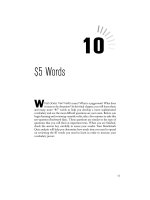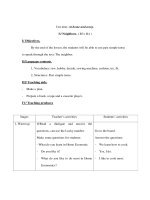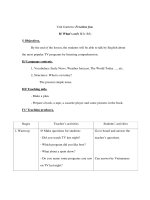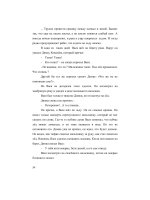Learning Express goof-proof Business Writing PHẦN 5 ppt
Bạn đang xem bản rút gọn của tài liệu. Xem và tải ngay bản đầy đủ của tài liệu tại đây (487.12 KB, 20 trang )
RULE #29: Don’t Sound Like a Robot
Let your personality show through your writing.
●
GOOF-PROOF IT!
●
Business writing should sound professional, not stiff or dull. Your
writing will be more interesting and easier to read if you let your
personality show through. Avoid sounding like a robot by fol-
lowing these guidelines:
• Don’t be afraid to use contractions in your e-mails, especially
when writing to colleagues you are familiar with.
• Don’t be short with your reader. A one- or two-word e-mail
with no greeting or closing salutation may come off as curt.
Always include a closing salutation and/or your first name at
the end of an e-mail. Avoid signing off or addressing people
with initials, and use friendly language, especially when
you’re delegating tasks or asking for favors.
• As a general rule, don’t use words or phrases that would
sound archaic or wooden if said out loud.
• Don’t be afraid to use the occasional exclamation point,
especially when thanking or complimenting someone.
• Always keep your own personality and individual prefer-
ences in mind. Never write anything that makes you feel
uncomfortable.
Compare:
J: Leave the finished reports on my desk before you leave. I will look
over them tonight and give you my comments in the morning.
K
With:
James,
Please leave the finished reports on my desk before you leave today.
I’ll look them over tonight, and we can talk about any changes or
revisions tomorrow morning.
64
goof-proof
BUSINESS WRITING
Thanks for all your help!
Karen
Compare:
The files you requested will be available presently. I will notify you
once they have been properly converted and formatted. If you have
any inquiries about the conversion or formatting process, please
bring them to my attention. Thank you for your patience.
With:
Hank,
The files you asked for yesterday will take longer to convert and for-
mat than I originally thought. Thanks for being so patient. I’ll let you
know as soon as they’re ready. If you have any questions, just let me
know.
— Stephanie
Choosing the Wrong Words
65
RULE #30: Formality versus Informality
The level of formality you use in writing a specific letter, memo, e-
mail, or report will depend on your audience and current
accepted standards.
●
GOOF-PROOF IT!
●
General guidelines for business writing today fall between the
very formal (proper, stuffy, and distanced) and the very informal
(use of slang, relaxed, and intimate). The level of formality should
increase when your audience is of a higher rank, or is less famil-
iar to you.
If you are writing to a colleague whom you know well, and
with whom you frequently correspond, your level of formality
may decrease. However, always retain the business in business
writing. Avoid slang, possibly offensive language, and other
examples of extreme informality.
●
GOOF-PROOF CHECKLIST
●
FORMAL WRITING
✓
Avoid slang words and phrases.
✓ Use full words rather than contractions (I will, not I’ll;
could have, not could’ve).
✓ Refer to others with a title (Mr., Ms., CEO, Esquire).
✓ Use formal opening and closing salutations.
✓ Don’t use five words when one will get the point across,
or use words considered archaic or pretentious (accord-
ing to, not as per; determine, not ascertain; think about,
not cogitate).
66
goof-proof
BUSINESS WRITING
[
QUIZ
]
Rate the following words as either formal (F) or informal (I). The
answers can be found on page 174.
a. permit
b. allow
c. eliminate
d. get rid of
e. more
f. additional
g. cannot
h. unable to
i. help
j. assist
Choosing the Wrong Words
67
RULE #31: Avoid Colloquialisms
Informal and overused language do not belong in your workplace
communications.
●
GOOF-PROOF IT!
●
Colloquialisms are words and phrases appropriate for speech, and
informal or casual writing. They don’t belong in business writing
unless you are trying to imitate speech or assume a very informal
tone. They include contractions (you’d, we’ll, aren’t, they’re,
shouldn’t), vulgarisms (obscene or offensive words), and clichés
and slang (see below).
• Contractions
The use of contractions is common in speech. In fact,
speech can sound stilted if you avoid them. However, in
business writing, contractions are usually too informal.
They may be gaining acceptance in e-mails, but in letters,
reports, and even most memos, they sound casual and
unprofessional. Avoid using contractions in all but the least
formal written business communications.
• Clichés
Clichés should be avoided not only because they are
informal, but also because they are overused. Your writing
should project your own voice, without relying on stale
phrases such as: add insult to injury, cream of the crop,
grin and bear it, pay the piper, and rat race.
• Slang
Slang is nonstandard English. Its significance is typically
far-removed from either a word’s denotative or connotative
meaning, and is particular to certain groups (therefore,
excluding some readers). Examples include: blow off,
canned, no sweat, and thumbs down (or up).
68
goof-proof
BUSINESS WRITING
[
QUIZ
]
Rewrite the following sentences to eliminate any colloquial words
or phrases. The answers can be found on page 175.
1. In conclusion, we believe you shouldn’t choose
our competitor’s product because they just don’t
get the technology the way we do.
2. The accident last Tuesday was a bummer; we
must install new floor mats to avoid another one
in the future.
3. They’re not sure if they’ll attend the meeting that
we’re holding tomorrow.
4. If worse comes to worst, our firm could always
tell the client their eleventh hour changes held
up production.
5. The decision to cancel the trip has been made;
you need to roll with the punches instead of cry-
ing over spilled milk.
Choosing the Wrong Words
69
RULE #32: Don’t Bewilder Your Readers
with Jargon
Workplace jargon and specialized language should be avoided or
used sparingly.
●
GOOF-PROOF IT!
●
You won’t get your message across efficiently if your reader has
to consult a dictionary to understand what you have written. Write
to your audience using language they will understand, eliminat-
ing or keeping to a minimum your use of business jargon.
• Buzzwords
Buzzwords are real words, with real meanings, used in
trendy ways for business purposes. This type of business
slang is at best pompous, and at worst, confusing. And like
other forms of slang, buzzwords don’t belong in business
writing.
Examples include: resultful (gets results), suboptimal (not the best),
guesstimate (estimate), leverage (use), modality (method), and right-
sizing (cutting excess).
• Technobabble
If you work in a field that constantly generates new words,
or uses highly technical or field specific language, you and
your colleagues will undoubtedly use those words in
conversation with one another, and in writing for an
audience of your peers. However, when corresponding with
a client, or someone else connected with your business but
not in the same field, it should not be used. Without writing
down to your audience, explain yourself using words that
may be understood by all.
70
goof-proof
BUSINESS WRITING
●
GOOF-PROOF SAMPLE
●
TECHNOJARGON
GlobalCommand, LLC is pleased to announce a strategic partnership with
the Wyckoff Group. Specifically, GlobalCommand, LLC will develop a secure
global communications network designed to meet the Wyckoff Group’s
demand for bandwidth-rich services at significantly lower price points, plus
improved quality of service.
GlobalCommand, LLC provides secure global communications through
the following services:
• worldwide satellite connectivity
• Internet broadband access to remote locations
• voice over IP (VoIP)
• Virtual Private Networks (VPN)
• streaming video and video conferencing
• global data integration and networking
GlobalCommand, LLC’s focus is on connecting organizations to remote
locations where traditional, terrestrial-based networks do not reach and
satellite is the optimum or only medium available to provide a high-
speed, always-on connection. We are an efficient, reliable approach to
global connectivity and security.
Capacity-Security-Global Reach—Redundancy Prevention:
These are the building blocks necessary to provide your business with supe-
rior, dependable communications. Through our services and solutions, any
Internet provider, business customer, content provider, or telecommunica-
tions carrier can receive the benefits of fault-tolerant telecommunications
through robust security products and communications services that operate
seamlessly across time zones and national borders.
Did you identify these words and phrases as technojargon?
• bandwidth-rich services
• terrestrial-based networks
• fault-tolerant telecommunications
Choosing the Wrong Words
71
What words or phrases might you use in their place when com-
municating with a non-technical audience?
• Legalese
Lawyers must also take care to avoid sounding pompous
and confusing their audience. When writing to those who
did not attend law school, avoid legal terms that are not
commonly understood. Compare the first example with the
second:
The following adjudication should be read in conjunction therewith
the aforementioned financial reports.
This verdict should be read in conjunction with the financial reports.
●
PUTTING IT ALL TOGETHER
●
When writing for a workplace audience, you must choose your
words carefully. That means understanding their meanings, and
being sensitive to their power. The wrong words not only make
you seem less intelligent, but they can also confuse, annoy, or
even offend your readers.
●
GOOF-PROOF GUIDELINES
●
Choose words wisely by following the Goof-Proof guidelines:
• Learn the meanings of commonly confused words (those
that sound or look similar, but have different meanings) and
end the confusion in your writing.
• Learn the meanings of frequently misused words, and use
them correctly.
• Don’t use words considered non- or substandard English.
• Replace biased language with inclusive language to keep
your writing from alienating or offending your audience.
72
goof-proof
BUSINESS WRITING
• Understand the positive and negative connotations of the
words you use. The wrong connotation can not only con-
fuse, but also offend your readers.
• Avoid overusing the suffix –wise.
• Write in your own voice to avoid sounding like a robot.
• Use the level of formality appropriate to your reader(s).
• Keep colloquialisms, such as slang and clichés, out of your
business writing.
• Don’t use pompous or confusing jargon, such as legalese,
technobabble, or buzzwords.
Choosing the Wrong Words
73
how persuasively you can argue a point, an inability to express
yourself clearly and accurately through the written word will hin-
der your success at work. The rules of mechanics are complex; in
fact, they sometimes confuse even professional writers.
However, you do not need to become a strict grammarian in
order to speak and write well. A few dozen grammar, spelling,
punctuation, and capitalization mistakes account for the majority.
If you learn these common errors and how to avoid or correct
them, your writing will greatly improve. Therefore, the focus of
this section is on those errors that occur most frequently.
The following rules will teach you the writing mechanics you
need to know at work. Remember: Your business writing is a
reflection of you. Your documents will show that you are smart,
articulate, and dependable when you use proper spelling, punc-
tuation, and grammar.
THE GOOF-UP:
NOT UNDERSTANDING THE BASIC
MECHANICS OF WRITING
section
FIVE
RULE #33: Remember the Parts of Speech
Identifying the six major parts of speech, and learning their most
common usage errors, will help you write clear, concise sentences.
●
GOOF-PROOF IT!
●
Some parts of speech are more difficult than others. The follow-
ing are those you will encounter most frequently in business writ-
ing, with usage explanations and examples.
●
Nouns
Nouns name people, places, things, and ideas. In a sentence, they
are often the subject—the person, place, thing, or idea that is
doing or being something. Nouns may be:
• proper (naming specific individual people, places, or things,
such as Susan B. Anthony, Santa Fe, and Kleenex)
• abstract (naming ideas or qualities, such as freedom and
confusion)
• collective (naming groups of people, animals, or things, such
as doctors, rabbits, and radios)
• compound (formed by combining two or more words, such
as freelance, drive-in, and power of attorney)
●
Pronouns
Pronouns refer back to or take the place of nouns. They should:
• agree in number (a singular pronoun must be used for a sin-
gular noun)
Correct: If the student passes this course, she will graduate.
Incorrect: If the student passes this course, they will graduate.
76
goof-proof
BUSINESS WRITING
• agree in person
Don’t switch back and forth in your writing from the first
person (I) to the second (you) or third (he, she, they, it).
First person pronouns: I, me, we, us
Second: you
Third: he, she, him, her, they, them
Correct: When a person comes to class, he or she should have his
homework ready.
Incorrect: When a person comes to class, you should have your
homework ready.
• be a specific reference to a noun
It should be obvious to your reader which noun the
pronoun refers to.
Incorrect: Kim spends all his time reading and playing soccer, but it
isn’t good for him.
What isn’t good for him? Reading, playing soccer, or both?
Correct: Kim spends all his time reading and playing soccer. Too
much soccer isn’t good for him; he should play some bas-
ketball, too.
Incorrect: It’s been years since they tore down that building.
Who is they?
Correct: It’s been years since the demolition crew tore down that
building.
Incorrect: I went on the trip with Emily and Nancy, and we took her
laptop.
Whose laptop? Emily’s or Nancy’s
Correct: I went on the trip with Emily and Nancy, and we took
Nancy’s laptop.
77
Not Understanding the Basic Mechanics of Writing
Verbs
Verbs depict action or a state of being. They tell the reader what
is happening to the subject of a sentence. Although there are
many types of verbs, the three you should be most aware of are
transitive, intransitive, and helping.
Some verbs require an object to complete their meaning: She
gave ? Gave what? She gave money to the church.
These verbs are called transitive. Verbs that are intransitive do not
require objects: The building collapsed. In English, you cannot tell
the difference between a transitive and intransitive verb by its
form; you have to see how the verb is functioning within the sen-
tence. In fact, a verb can be both transitive and intransitive: The
monster collapsed the building by sitting on it. vs. The monster col-
lapsed.
Helping verbs or auxiliary verbs such as will, shall, may, might,
can, could, must, ought to, should, would, used to, and need are
used in conjunction with main verbs to express shades of time
and mood. The combination of helping verbs with main verbs
creates what are called verb phrases or verb strings. In the fol-
lowing sentence, will have been are helping or auxiliary verbs and
studying is the main verb; the whole verb string is italicized:
As of next August, I will have been studying chemistry for ten
years.
●
Adjectives
Adjectives describe or modify nouns or pronouns. They add
information by describing people, places, or things in a sentence.
These words add spice to our writing.
Adjectives can take the following forms:
• descriptive (qualify the properties or behavior of nouns or
pronouns: pretty, turquoise, heavy)
She loves red roses.
The dog was large and mean.
78
goof-proof
BUSINESS WRITING
• limiting (place boundaries or limits on the noun or pronoun
they are modifying: this, whose, any)
This hat isn’t mine.
I don’t want any ketchup on my hamburger.
• compound (formed by combining two or more adjectives:
full-time, brown-eyed, long-haired)
He found a full-time job.
The long-haired dog shed all over the carpet.
• articles (the words the, a, and an)
The house is up for sale.
Can you hand me an apple?
●
Adverbs
Adverbs are words that describe verbs, clauses, adjectives, and
other adverbs. They are easily spotted because most of them end
in –ly, such as slowly, quickly, abruptly.
For example:
The black cat moved slowly.
The ridiculously long book was impossible to finish in one sitting.
When writing a question, you must use an interrogative adverb
such as how, what, where, when, or why. These adverbs ask ques-
tions that modify verbs, clauses, adjectives, and other adverbs.
●
GOOF-PROOF RULE OF THUMB
●
The word good is an adjective, not an adverb, and should be used
to describe nouns. In the following sentence, good describes the
noun pasta: The pasta you made last night was good. Good should
never be used as an adverb. In the following sentence, good is
used to describe the verb played, which is incorrect: I played good
in the basketball game. The correct word to use in such instances
is well, good’s adverb counterpart. Written correctly, the sentence
would read, “I played well in the basketball game.”
79
Not Understanding the Basic Mechanics of Writing
●
Prepositions
Prepositions connect words that link a noun or pronoun to
another word in a sentence. They are often used to show a rela-
tionship of space or time.
For example:
The box on your desk
is your birthday present.
The holiday
that follows immediately after your birthday is Valentine’s Day.
The first sentence uses the preposition on to describe the spa-
tial relationship between the box and the desk. The second sen-
tence uses the preposition after to describe the time relationship
between holiday and birthday. On your desk and after your birth-
day are prepositional phrases.
COMMON PREPOSITIONS
aboard about above after among around at before
behind below beneath beside between by except for
from in inside into like of off on
outside over to under up upon until with
within
The three most common problems with prepositions are:
1. Using Them Unnecessarily
Because it is so important in business writing to get to the
point concisely, unnecessary prepositions should be
avoided. Remember that when two or more prepositions
are used together, chances are at least one is unnecessary.
Poor form: I cleaned up under the kitchen cabinets.
Good form: I cleaned under the kitchen cabinets.
Poor form: She likes all sports except for soccer.
Good form: She likes all sports except soccer.
Poor form: They looked outside of the house for the lost cat.
Good form: They looked outside the house for the lost cat.
80
goof-proof
BUSINESS WRITING
2. Using the Wrong One in a Standard Combination
Certain words must always be followed by certain
prepositions. These necessary prepositions are always used
in combination with their respective supported words.
Below are two examples of required prepositions—the
preposition is in italics and the supported word is
underlined. It is important to remember that they must
always be used together:
You must account for every item on your expense report.
The meal consists
of eight separate courses.
Here is a list of several required prepositional pairings:
account for agree upon angry with argue about
compare to correspond with differ from different than
identical to independent of interested in speak with
3. Confusing Between and Among
The third common mistake with prepositions involves the
use of between and among. Between is used when talking
about two things. Among is used when talking about
more than two things:
The boss had to decide between cutting new hires, or handing out
Christmas bonuses.
The work was divided evenly among marketing, finance, and oper-
ations.
●
GOOF-PROOF RULE OF THUMB
●
Of all the rules governing prepositions, none is more famous than:
Never end a sentence with a preposition! While this rule holds true
for many situations, it is not an absolute. You can still end a sen-
tence with a preposition if it makes the sentence flow better. For
example, in popular speech, it sounds much more natural to say
“That’s all I can think of” than “That’s all of which I can think.”
The best technique for deciding to keep or remove preposi-
tions at the end of sentences is to use your ear. What would the
81
Not Understanding the Basic Mechanics of Writing
statement sound like if you kept—or dropped—the preposition?
What point are you trying to emphasize in your statement? Is this
a formal statement or a casual conversational statement?
The timeless question of to keep or to cut the dangling prepo-
sition ultimately comes down to the desired effect. Here are some
examples of prepositions placed in different positions within sen-
tences:
I thought I knew what company she worked for.
I thought I knew for which company she worked.
The first sentence sounds like a casual conversation, although
it does not strictly adhere to the rule of not ending a sentence
with a preposition. But, it does sound natural. The second sen-
tence follows the grammatical rule, but it is not the kind of state-
ment you are likely to hear in everyday conversation. This
sentence is more formal than the first, but may be appropriate in
certain situations.
Many times, short questions are ended in prepositions. Here
are some acceptable and unacceptable examples. Note that the
unacceptable sentences could be improved simply by dropping
the prepositions at the end.
Good Form:
Does he have anything to worry about?
What did you use to make it with?
What is the report comprised of?
Poor Form:
Is the construction project over with?
Where is the report at?
Where do you want to go to?
82
goof-proof
BUSINESS WRITING
RULE #34: Avoid Dangling Participles and
Misplaced Modifiers
As stated at the beginning of this section, a few types of errors
account for most of the grammatical mistakes found in business
writing. What follows are ways to avoid dangling participles and
misplaced modifiers.
●
GOOF-PROOF IT!
●
Dangling participles and misplaced modifiers, although some-
times difficult to recognize, are easily fixed by rearranging the
sentence.
A dangling participle is a phrase or clause, using a verb end-
ing in –ing that does not refer to the subject of the sentence it
modifies. Since it is so critical in business writing to make the
reader understand your point easily and exactly, dangling modi-
fiers (and indeed any ambiguous language) must be avoided.
Incorrect: While working on the annual financial report, Tony’s com-
puter crashed.
(Was the computer working on the report?)
Correct: While Tony was working on the annual financial report, his
computer crashed.
Note that correcting a dangling participle involves adding
and/or rearranging the words in a sentence to make the meaning
clear.
Incorrect: While reading the morning paper, the noisy coffee pot dis-
tracted Jim.
Correct: While Jim was reading the morning paper, he was dis-
tracted by the noisy coffee pot.
Or
83
Not Understanding the Basic Mechanics of Writing









